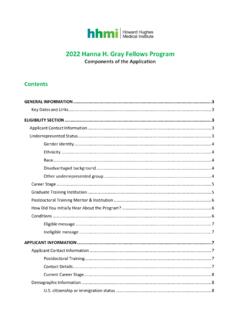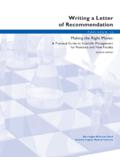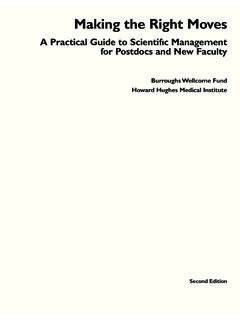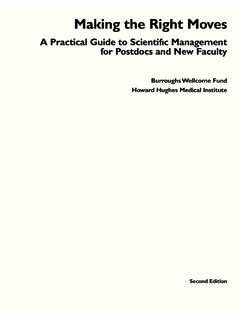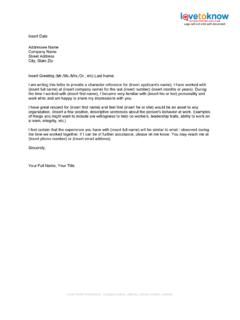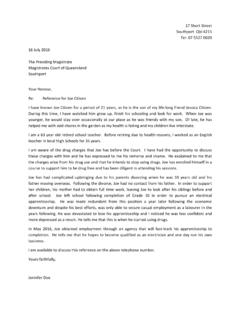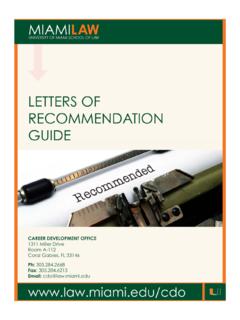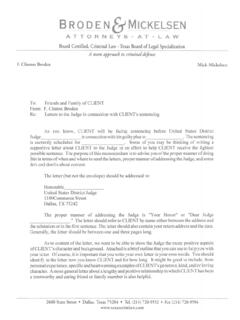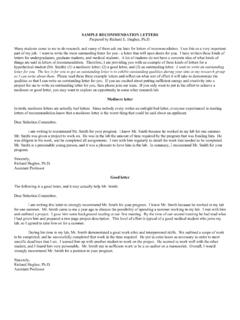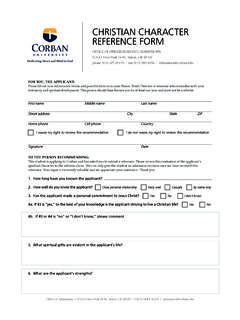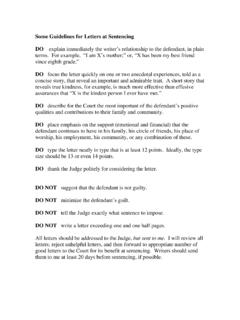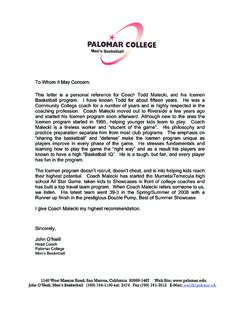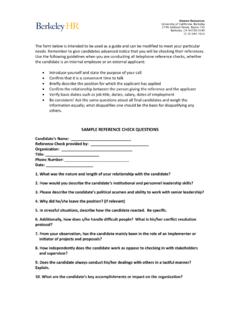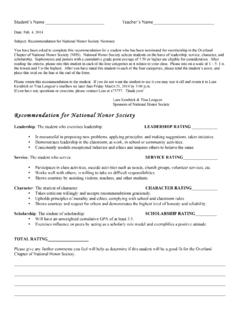Transcription of Writing a Letter of Recommendation - Science Forward
1 Burroughs Wellcome FundHoward Hughes Medical Institute Writing a Letterof RecommendationAddendum toMaking the Right Moves:A Practical Guide to Scientific Managementfor Postdocs and New Facultysecond editionMaking the Right Moves: A Practical Guide to Scientific Management for Postdocs and New Faculty, second edition 2006 by the Howard Hughes Medical Institute and Burroughs Wellcome FundAll rights reserved. Writing a Letter of Recommendation : Electronic addendum published 2009 Writer: Laura Bonetta, : Martine Bernard Design Permission to use, copy, and distribute this publication or excerpts is granted provided that (1) the copyright notice above appears in all reproductions; (2) use is for noncom-mercial educational purposes only; and (3) the publication or excerpts are not modified in any way (except when used for noncommercial educational purposes). Requests beyond that scope should be directed to views expressed in this publication are those of its contributors and do not necessarily reflect the views of the Howard Hughes Medical Institute or the Burroughs Wellcome publication is available online at Wellcome Fund21 Alexander Box 13901 Research Triangle Park, North Carolina27709-3901 Hughes Medical Institute4000 Jones Bridge RoadChevy Chase, Maryland 20815-6789 HHMI 1 Writing A Letter OF RECOMMENDATIONAs a beginning independent investigator, chances are you will soon have to write a Letter of Recommendation on behalf of a student, a postdoc, or even a colleague.
2 Your job as Letter writer will be to describe the candidate s strengths and weak-nesses as they relate to the position or program in a way that is both thoughtful and personal. A Letter that falls short of this goal will be of little value to those evaluating applications and will not help the candidate get what he or she is after. So, it pays to put in the necessary effort and time to write a good Letter . This chapter provides insights and advice from experienced investigators on how to do so. It is not meant to be prescriptive but rather to offer some suggestions from which you can pick and ASKED TO WRITE A LETTERL etters of Recommendation are ubiquitous in an academic research career. If you teach one or more senior-level undergraduate courses or have undergraduate students in your laboratory, you might have to write dozens of letters a year as students become graduate-school bound or look for employment. If you do not teach undergraduates and have primarily graduate students and postdocs in your lab, you will have significantly fewer letters to write maybe for only one or two people each year.
3 In addition to the people in your own lab, graduate students and postdocs in your department may ask you to write letters for them when they apply for fel-lowships or seek new positions. Colleagues might also ask you to write letters of Recommendation on their behalf for various promotions or awards, but that may not happen too often until you are more Whom Should You Write?As a mentor, you have an obligation to support students and postdocs in your lab in their job search and to help them find a good match for their abilities and aspi-rations. If they ask you to write a Recommendation Letter , it is customary to sup-port them in this way. The best thing to do is to sit down with them and discuss their plans before they start applying for jobs. If their career goals are unrealistic, talk about what they need to do to become more competitive or help steer them 2 BWF HHMI Making the Right Moves A Practical Guide to Scientific Management in a different direction. If you do end up Writing a Letter for someone in your lab for a job you don t think is a good fit, there are ways to put a positive spin on the negative (see page 6, Writing a Not-So-Enthusiastic Letter ).
4 If people who are not part of your lab ask you to write a Letter for them, it is up to you to decide whether to do to Turn Someone DownYou should write a Letter of Recommendation only if you can honestly write a supportive Letter for someone for a given position. After all, a Letter of recom-mendation is supposed to be a tool for helping people obtain what they are after. If you don t know the candidate well enough to write a good Letter , let the person know. He or she will probably ask someone you do know the candidate well but have some reservations, let the person know about your concerns, and leave it up to him or her to decide whether you should still write the Letter . PREPARATIONRead Some Sample LettersIf you have never written a Letter of Recommendation before, read a stack of reference letters to see what works and what doesn t. Most faculty have access to graduate student applications and the letters submitted. Junior faculty can also ask their more experienced colleagues to share sample letters they have written or have received from applicants (blocking out names and other personal infor-mation).
5 The resource section of this chapter provides links to sample Information Once you know what a Letter of Recommendation looks like, make sure you find out as much as possible about the candidate for whom you are Writing . One of the worst things you can do is to write a Letter that is too generic. Ask for the following information: For people in your lab you prob-ably already have a current curricu-lum vitae (CV), but also ask for as complete a description as possible of the position or program for which the person is applying. Tip: When reading a sample Recommendation Letter , try to put yourself in the position of who-ever is going to read it, keeping in mind that you could be reading the Letter late at night or when you are pressed for time. Ask yourself which let-ters stand out and then use them as models for your own letters. BWF HHMI 3 Writing a Letter of Recommendation For people who are not in your lab ask for a current CV that includes the dates and locations of their training and a list of publications as well as copies of any papers that are in press or that have been submitted.
6 For people who were in your lab but have since moved on ask for a written summary of their current work, future plans, and why they are interested in the position for which you are Writing the Letter . For students who are not in your lab or department but who were in one of the classes you taught ask for transcripts and check your class records. Many reference writers find it helpful to meet with the person who has requested the Letter of Recommendation . In such a meeting you can learn about the person s long-term career goals and how his or her current research and other activities re-late to these goals. Ask about the programs or positions for which letters are being requested and what the individual s prefer-ence is and why. You should also discuss the candidate s strengths and weaknesses as they relate to these positions. If you cannot have a face-to-face meeting, ask the candidate for a detailed written description of these Sufficient Time to Write and Send the LetterOnce you have gathered the data and marked the deadline on your calendar, make sure you set aside enough time to write the Letter .
7 It can take one to two hours, sometimes longer, to craft a well-written Letter for one individual. (It takes less time to tweak this initial Letter for different programs or positions the same individual has applied to.)The candidate should give you clear instructions on how and where to send the Letter . Some letters have to be submitted online, some e-mailed, and others sent by snail mail. WHAT THE Letter SHOULD SAYKeep the following pointers in mind when you craft your Letter . Introduce Yourself and the CandidateBegin the Letter by describing how you know the candidate. Briefly state your own qualifications so that people who don t know you can decide whether to Tip: Don t ask the candidate to write a draft of the Letter for you. Most heads of labs say this rarely saves time and sometimes leads to a weaker Letter . It is better for the candidate to provide you with all the necessary information, from which you can then pick and choose as you write your BWF HHMI Making the Right Moves A Practical Guide to Scientific Management trust your judgment.
8 But don t go overboard and make the Letter about yourself!For example, During my years of training as a postdoc and now as a faculty member, I have worked with and personally trained more than xx graduate students in laboratories at the University of Michigan, Harvard Medical School, and, currently, at Emory University. In my opinion, candidate x is among the top 5 percent of the graduate students I have known. (You may want to include students you trained as a postdoc, if you have not yet had many students in your own lab.)Present the Candidate Truthfully but PositivelyDevote several paragraphs to discussing the candidate s scientific work and personality, following the suggestions specific. Give meaningful examples of achievements and provide stories or anecdotes that illustrate the candidate s strengths. Don t just praise by using gen-eralities (such as quick learner ), but say what the candidate did to give you that impression. These details will show you have a strong relationship and also bring the candidate alive on the page.
9 If the candidate works in your laboratory, make sure the Letter talks about his or her specific contributions to the lab s research. Student x is the first person to successfully master in vivo imaging in my laboratory and did all the trouble-shooting calibration and testing com-pletely independently. Student x is the first student in my lab to have a first-author Cell paper. She contributed data for five of the figures and made an important intellectual contribution to the experimental design and to Writing the discussion. Candidate x s research was submitted as an abstract and was accepted for a podium presentation at the American Association for Cancer Research national meeting earlier this year. Al-though she is an undergraduate student, I treated candidate x in the same manner I would treat an experienced graduate student by having her prepare and present the talk independently. At the meeting, she presented the work and answered all the questions from the audience in a clear and professional manner.
10 After the talk several scientists came up to express how impressed they were with the presentation. Tip: Don t make the Letter too short, because it will give the reader a negative impression of the candidate. Letters of Recommendation should be between one and two pages. BWF HHMI 5 Writing a Letter of Recommendation You don t just have to describe the candidate as he or she is right now you can discuss the development the person has undergone. When candidate x came to the lab he showed promise but was not able to plan experiments effectively. Through his own hard work he has ac-quired this skill and has become an excellent scientist. Quantify and compare. Find a way to quantify the candidate s abilities, espe-cially with respect to other scientists who have achieved success in the field and who the Letter reader might know. Many Letter writers rank the applicants accord-ing to their own measure of what makes a good researcher, graduate student, or technician. Depending on the position, most people rank candidates according to a combination of research strength, leadership skills, Writing ability, oral commu-nication, teaching ability, and collegiality.
